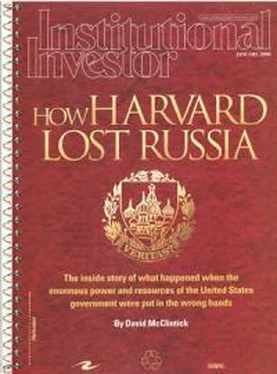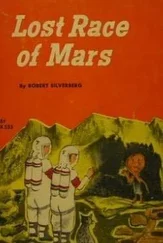But back in 1991, Sachs and the HIID people were not the only bold folks in the race for the spoils. Goldman Sachs, in what would prove to be co-chairman Robert Rubin’s bright and shining moment, was present, too. The Goldman Sachs of 1992 was not the giant squid suffocating humanity that it is today. It was a private investment-banking partnership, which meant the firm’s backing was the partners’ private fortunes. No set of regulations any government might devise and impose on finance and banking will ever function as efficiently as the possibility of a banker losing his own money.
While Anatoly Chubais, the deputy prime minister of the Russian Federation, and Sachs’s team were kicking around ideas for a national privatization program in Russia, the Committee on Foreign Investment, which Gaidar had established under Leonid Grigoriev, engaged Goldman Sachs to handle the privatization of large enterprises—the very assets that would eventually be handed out to insiders in 1995’s infamous loans-for-shares privatization.
Bill Potvin, chief of Deloitte & Touche’s Moscow office, said Goldman Sachs thought the commission had given the firm a mandate and sent in 30 people to mine the deal: “It was a strategic mistake. Goldman bought full-page ads in the Financial Times and hired Cleary Gottlieb, a big white-shoe law firm. Critically, Goldman Sachs wanted to go deal by deal.”
Sachs and the HIID people were appalled. If Goldman was running privatization of the cash-gushing natural-resource firms on a slow-moving, careful, deal-by-deal basis as Russia’s contracted agent, what power, glory, influence, and riches would there be for them and their Western sponsors?
The HIID principals Anatoly Chubais had put on GKI (the privatization committee) quickly went to work to undermine Rubin. “Jeffrey Sachs was not on that mission, but [Maksim] Boyko was his protégé. There was quite a debate at that time, well, it was a real fight between Goldman Sachs and Jeffrey Sachs. Sachs versus Sachs. Jeffrey Sachs said throw the whole thing to the market, mass privatization would be ‘more academically interesting,’” Potvin said, explaining why a photograph of Robert Rubin alongside Yegor Gaidar and Leonid Grigoriev announcing the deal had appeared in all the right newspapers, only for Rubin then suddenly to vanish.
“Afterward, the Foreign Investment Commission was disbanded, and Grigoriev was sent to the World Bank to get him out of the way,” Potvin added. “The entire business was a huge embarrassment to Goldman.”
And a huge loss for Russia. Had the arrangement with Goldman Sachs been allowed to stand, Goldman’s fiduciary obligation would have been to the Russian state. Instead of savvy, purposeful professionals whose very business would be to find qualified large investors and who could have best negotiated workable terms to protect investors’ capital and the value of the Russian people’s legacy within the boundaries of what Russia was willing to agree to, the Russians got Jeffrey Sachs’s and the HIID contingent’s fraternity of academics and graduate students, who were legally obligated to USAID and not to Russia. Thereafter, any chance of positively transforming Russia was lost, as shares-for-loans would prove.
In the December 1993 parliamentary elections, a furious electorate let the government and the foreigners know just what they thought of Yeltsin’s August 1993 bombing of the Russian parliament (and of his Duma adversaries within, who were demanding a rollback of Chubais’s criminal privatization). The communists and nationalist Vladimir Zhirinovsky’s Social Democrats triumphed, the West’s “eager young reformers” earning the support of no more than 15 percent of Russian voters.
Sachs and Åslund resigned their much-disputed “official” positions and decamped to Ukraine in January 1994. (When reporters asked Prime Minister Viktor Chernomyrdin about their resignations, he had to inquire as to who they were, as he’d never heard of them.) Joined by George Soros in Kiev, the three men went to work establishing a shared office. They then began a years-long lobbying campaign for congressional funding to establish an HIID office in Ukraine under their control. Once funded, nothing much came of the effort, since USAID’s bumbling self-dealing was outclassed by that of the natives. Still, topping up HIID coffers with another big bag of U.S. taxpayers’ money didn’t hurt in getting Sachs a 1995 appointment to head up HIID in Cambridge, Massachusetts.
Sachs had once more gotten his career back on track, despite the bad publicity and complaints HIID’s Moscow reforms were beginning to attract. Before long, the position would prove a poisoned chalice when a GAO audit of HIID’s Moscow operations brought the roof down on the Harvard Institute. Though Sachs had nothing to do with HIID’s conflicts of interest in Moscow (he was never accused) the scandal and subsequent court proceedings would fill the headlines and a string of reports for the next eight years; as the head of HIID, Sachs would have to see his name appearing in each one. The exposure of HIID’s dark deeds worked to liberate Sachs’s critics, and the results of his own work came under scrutiny from his leftish political allies.
Sachs remained at his post and moved to Harvard’s Center for International Development when the university folded HIID’s operations into it. In those years, Sachs turned his attention to Africa and began beavering away at developing what he calls “clinical economics,” which emphasizes public healthcare, social services, national safety nets, microlending to the poor, etc . While polishing up his “expert” credentials with intense study, Sachs got lucky again when the most perfect beard imaginable—one who would assuage his disappointed admirers and fuel his comeback—dropped seemingly from the heavens into his lap.
That beard was Bono, the activist singer of U2, whose campaign on behalf of Jubilee 2000 for the cancellation of the least-developed countries’ debt to the rich countries led to Bobby Shriver (of the Kennedy clan) suggesting that Bono meet with Sachs. The two men traveled across Africa together, aiding and abetting each other’s projects. Thus was the rock-star economist born.
Suddenly, Sachs had what few economists can claim: a brand-new coterie of really good-looking and celebrated youth icons like Angelina Jolie, whose Diary of Angelina Jolie & Dr. Jeffrey Sachs in Africa aired on MTV. What university professor could ask for more?
Jeffrey Sachs could, and did.
In 2002, Sachs got the plum job of director of Columbia University’s new Earth Institute, a reportedly $500,000 annual salary, and an appointment as special advisor to U.N. Secretary-General Kofi Annan. He also achieved the status of best-selling author after his 2004 tome (with an admiring Introduction by Bono) sold hundreds of thousands of copies. To top off one sweet deal, Columbia provided Sachs with an eight-million-dollar townhouse on Manhattan’s Upper West Side. Apparently, nothing was too good for the university’s newest rainmaker.
The good news just kept coming. George Soros and others financed his Millennium Villages Project, which seems to have amounted to not much more than the creation of a land-based archipelago of cargo-cult hamlets that depend on continual infusions of donated capital.
In time, the Hollywood set drifted away, but they were replaced by a truly celestial partnership with the Holy See, which was financed once again by George Soros. Abortion advocate Jeffrey Sachs, to the consternation of many Catholics, was named an advisor to Pope Francis on climate change and healthcare, and began conducting classes at the Vatican.
While thumbing through Sachs’s oeuvre recently, I began to appreciate why each student of his I have randomly encountered over the years was an enthusiast for his former professor. Sachs writes well, and he has a unique ability to inspire pain-free idealism in the Ivies’ privileged students through missionary-like, call-to-service exhortations.
Читать дальше






![Джонатан Димблби - Barbarossa - How Hitler Lost the War [calibre]](/books/385421/dzhonatan-dimblbi-barbarossa-how-hitler-lost-the-w-thumb.webp)





